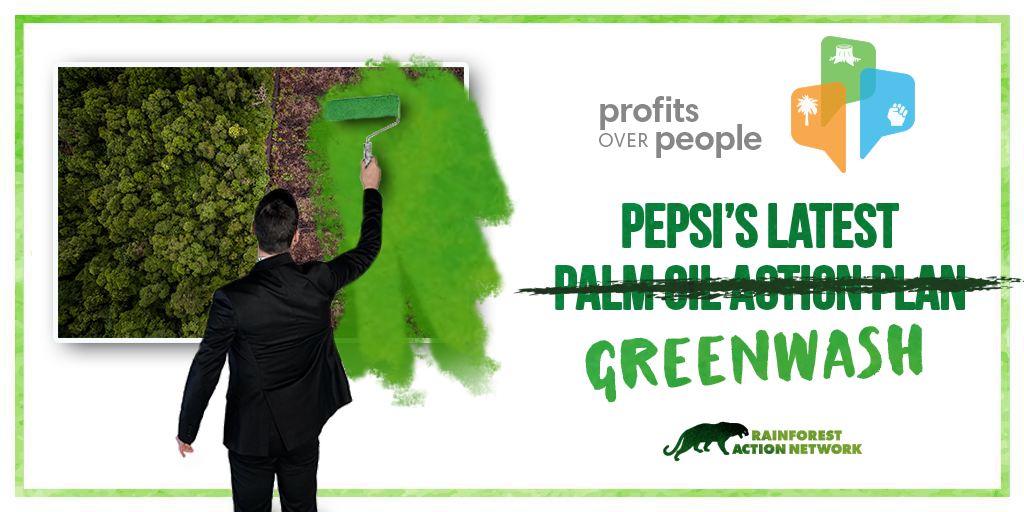PepsiCo, a well-greased corporation worth $18.2 Billion, is no stranger to stretching the truth, healthwashing its junk food, and greenwashing its environmental destruction. For over a century, PepsiCo has profited off its brutal combination of sugar, fats and salt despite the known consequences to consumers’ health and the company’s incredibly destructive and opaque supply chains.

In the last few decades, PepsiCo has invested massively in the execution of effective PR campaigns to convince consumers that its products are an essential part of life and worth supporting at supermarkets across the planet. PepsiCo has recently rolled out a ‘Palm Oil Progress Report’ that is its latest masterful attempt to mislead consumers. This time its PR aims to convince its consumers and investors that it is addressing the known cases of Conflict Palm Oil in its supply chain.
Don’t be fooled, PepsiCo’s ‘Progress Report’ is 16 pages of corporate double-speak. Here are the top five reasons why you shouldn’t believe PepsiCo’s claims of sustainability.
- PepsiCo claims that its policy applies to all of the palm oil used to make its products, yet the company continues to allow Indofood—via a joint venture partnership—to produce its products in Indonesia despite its documented systemic exploitation of workers. Right now, workers producing palm oil for PepsiCo’s business partner continue to be denied adequate pay, are exposed to toxic chemicals without adequate protection, are forced to bring unpaid workers to earn meager quota-based wages, and much more.
- PepsiCo claims a commitment to end deforestation, yet just in the last month its suppliers were implicated in the destruction of Southeast Asia’s most important rainforests in the Leuser Ecosystem&—the only place on earth where Sumatran elephants, orangutans, tigers and rhinos coexist in the wild.
- PepsiCo continues to hide behind the false sustainability claims of the industry certification system, the RSPO, which is the same broken system that continues to provide PepsiCo and others with so-called certified sustainable palm oil produced by companies that are engaged in human rights abuses, child labor, and deforestation.
- PepsiCo is proclaiming it received top scores in WWF’s scorecard and was recognised for ‘leading the way’. Yet WWF described the company as ‘not yet in the starting blocks’ and gave it a disgraceful score of 2.8 out of 10 for efforts to go beyond corporate commitments and reform its supply chain. This ranking is not the glowing endorsement that PepsiCo is making it out to be in its PR campaigns that aim to mislead consumers across the globe.
- Despite its policy proclamations, and 16 page progress report, field investigations in Latin America prove that PepsiCo has not ended its ties to bad actors involved in the kidnapping and intimidated human rights defenders and massive fish kills resulting from toxic effluent pollution into local waterways in Guatemala.
For years, PepsiCo has denied the fact that its palm oil supply chain is tainted with Conflict Palm Oil. The one element of truth in its progress report is its open acknowledgement that deforestation and labor rights violations are rampant in the palm oil industry. Despite its recognition of the issues in its supply chain, PepsiCo has shown its true colours by has once again failing to set a deadline by which its will end these atrocities that are caused in part by the production of PepsiCo products sold across the globe.
As PepsiCo continues its attempts to greenwash its links to deforestation and human rights abuses, it’s more important than ever that we call out PepsiCo’s greenwash publicly.
PepsiCo, your palm oil “progress” is a farce. The truth is that your company continues to make billions while rainforests fall and workers in your supply chain are exploited for Conflict Palm Oil. Instead of nice words, take real action to end the exploitation.
If you’re not on social media you can also call the company at 1 (800) 433-2652.
